#media literacy challenge go!
Explore tagged Tumblr posts
Text
"izuocha is canon because ochako likes izuku!" OK WELL IF THATS THE CASE, THEN ISNT TOGACHAKO TECHNICALLY CANON BECAUSE TOGA CANONICALLY HAS FEELINGS OF LOVE. LITERAL LOVE. FOR OCHAKO???
#bnha#mha#boku no hero academia#my hero academia#togachako#himiko toga#uravity#ochako uraraka#ITS SO FUCKING STUPID WHEN THEY ARGUE W THATTT KINDA ARGUMENT#LIKE WHAT THE HELL R U IMPLYING LMAOOO#like quick act surprised!#they b hating cz izuochas canon ON OCHAKOS END#THEN WHAT AB TGCHK??? WOULDNT THEY BE CANON TOO??#media literacy challenge go!
173 notes
·
View notes
Text
I think some of you are not mentally or emotionally ready for gothic horror, or anything that takes place in the 19th century while portraying that time period and the attitudes of the time accurately.
#nosferatu#nosferatu 2024#you have no appreciation for the genre#you lack media literacy and comprehension#you have the constitution of wet toilet paper in the face of anything even remotely morally challenging#maybe you should stick to wwdits or iwtv#nosferatu/dracula seems to be a little too advanced for some of you#some of yall can't even handle a bittersweet ending and think Ellen should have become a Super Badass Modern Vampire Slayer Girlboss#please go watch something else this clearly isn't your speed
21 notes
·
View notes
Text
today i made the mistake of arguing with an ascended astarion fan on tiktok
//just a rant//
they said he deserved ascension after all he went through and i replied that "he doesn't, he deserves better than becoming an abuser and loosing himself" and now everyone is telling me im shaming someone for stating the FACT that astarions bad ending is ascension and that him being a spawn is a better one. i also said that he was no longer astarion and just a husk of his former fear and motivations.
do not make my mistake friends, stay away from ascended astarion fans
some of the arguments were:
"he suffers everyday as a spawn" yeah i suppose he does with his hunger and inability to go in the sun, but he is clearly happy in the epilogue, he accepts his struggles and is still HAPPY!! stupid argument
"he is safer as an ascendant" nuh uh, he is powerful now, known and powerful making him a target for other powerful people or beings. objectively it puts him on the map and makes him a target. whose to say in years to come someone he possibly enslaved gains the power to turn on him as well and he ends in a similar way to how cazador did.
the genral "he loves tav/durge" no. no he doesn't. i dont need to elaborate
(also i wasnt telling them to NOT ascend astarion, i was just correcting them when the suggested it was a good outcome for him when it is objectively not. ascend him if you want guys!!!)
29 notes
·
View notes
Text
Sorry but I genuinely hate people who dumb down Heizou’s character as sexual just because of his slightly suggestive voicelines. I know fandoms making characters seem very one-dimensional is common but like. Did we not play the same hangout.
#personally I find him very complex actually#you don’t even have to up friendship with him to get what I’m talking about#genshin players vs media literacy challenge go#genshin impact#shikanoin heizou#heizou#i love him so so much
40 notes
·
View notes
Text
Can someone please explain to me why my TikTok feed gave me the option to get less content about CRITICAL THINKING

What the actual fuck.
#pls don't explain it to me I already want to end myself seeing it#TikTok babydoll imma hold your hand when i tell you i read about sociology for fun#critical thinking#or the lack thereof#this is why the media literacy in the global population is dying#also TikTok you are only still on my phone bc I was bored while on uni break don't push your luck#anyway pro tip: you are not immune to propaganda. you are not immune to unconscious bias.#never be afraid to escape your echo chamber and find points of view that challenge you for better or worse#bc like it or not you need to know that those points of view exist#this is especially aimed at fellow white people#not as an attack but as a reminder that it's okay to not know things but we can't stop learning how to be better than our ancestors#if this is incoherent it's bc my brain is fried lmao#anyway I'm gonna go poke at the stupidity that is the whole Eurabia conspiracy theory#bc if the far right is making moves in Germany i need the refresher before our federal election bc SOMEONE'S gonna bring it here again#and her name rhythms with Hauline Panson
9 notes
·
View notes
Text
the sooner badboyhalo viewers realize he’s an unreliable narrator the sooner I’ll be able to sleep at night
#qbbh is unreliable he’s a little bit of an asshole he’s the worlds biggest hypocrite he’s self centered and in it for his own interests#he lies for fun he dishes out ‘pranks’ and ‘memes’ but cannot handle it when the role is reversed he needs things to go his way or he’ll#lose his muffins like#and I love it for him! his character can be frustrating sure but it’s fun he plays a good role!!#but bbh chat you are the bug under my shoe. be normal. learn what rp means for the love of god#media literacy! critical thinking! reading anything other than Twitter posts and hot takes please!#I’m once again seeing weird takes and it’s like man. qBad is so misunderstood. not for all the reasons you think though#he’s not misunderstood because he’s really in the right or good or whatever. he’s misunderstood because nobody understands his characters#views or intentions. i don’t think his character fully does either! unreliable narrator! please for the love of god!#I know I’ve made a whole other in the tags rant about this before but like it’s never been more applicable again#bad’s twitch chat be normal challenge level IMPOSSIBLE#and I don’t get why man. take example from the doozers w foolish. from jorge w bagi. Cellbit’s chat (for the most part) even#idk anyways#mcyt#qsmp#bbh#z speaks
48 notes
·
View notes
Text
i just opened twitter for the first time and i already hate it on there.. why are people saying that there is IMPLIED BESTIALITY ??? ? in RTC? ?? like god damn hellio he is not actually fucking cats
#cant believe a twitter user is upset about the idea of furries#they were also mad because ocean is ableist. ocean IS ableist.. thats the point..#media literacy challenge go#i hate it on there but i need it in order to find more productions so i can have more janes for my masterlist#rtc#ride the cyclone#ricky potts
8 notes
·
View notes
Text
The world is so hostile to tweens.....
Like we joke about how our schools growing up would ban the latest toy trends, but that reality genuinely horrific when you think about it. Like maybe 1% of the bans were based on safety, but the rest cited reasoning like
-"kids were bartering for collectibles" (kids learning about economics and product value)
-"kids were wearing them and the colors were too flashy" (kids experimenting with self expression and fashion)
-"kids were playing with them during lunch and recess instead of using our rusted safety hazard playground" (kids utilizing their free time to do what helps *them* unwind).
Play areas specifically geared towards children and especially towards teens are constantly being shut down. "Oh kids today are always on their phones!" Maybe because
-there are barely any arcades left and even less arcades that aren't adult-oriented,
-public pools and gyms are underfunded and shut down,
-"no loitering" laws prevent kids and teens from just hanging out,
-movie theatres only play the latest films and ticket prices are only rising,
-parks and playgrounds are either neglected or replaced with gear only directed at toddlers and unsuitable for anyone older
-genuine children's and young teen media is being phased out in favour of media directed only at very small children or older teens and adults.
-suburbs and even cities are becoming more and more hostile to pedestrians, it's just not safe for kids to walk to or ride their bikes to their friends' houses or other play destinations
Children's agency is hardly ever respected. Kids between the ages of 9-13 are either treated as babies or as full-grown adults, with no in-between. When they ask to be given more independence, they are either scoffed at or given more responsibilities than are reasonable for a child their age.
This is even evident in the fashion scene.
Clothing stores and brands like Justice and Gap are either closing or rebranding to either exclusively adult clothing or young children's clothes, with no middle ground for tweens. Tweens have to choose between clothes designed for adults that are too large and/or too mature for their age and bodies, or more clothes they feel are far too childish. For tween girls especially it's either a frilly pinafore dress with pigtails or a woman's size dress with cleavage. No wonder tween girls these days dress like they're older, it's because their other option is little girl clothes and they don't want to feel childish.
And then when tweens go to school, the books they want to read aren't available because they cover "mature" topics (read: oh no two people kissed and they weren't straight or oh no menstruation was mentioned or oh no a religion other than Christianity is depicted), so kids are left with books for way below their reading level. No wonder kids today are struggling with literacy, it's because they can't exercise and expand their reading skills with age-appropriate books. Readers need to be challenged with new words and concepts in order to grow in their skills, only letting tween read Dr. Seuss and nursery rhymes doesn't let them learn.
Discussions about substance use, reproduction, and sexuality aren't taught at an age-appropriate level in school or even by children's parents, so they either grow up ignorant and more vulnerable to abuse, or they seek out information elsewhere that is delivered in a less-than-age-appropriate manner. It shouldn't be a coin-toss between "I didn't know what sex was until I was 18 and in college" or "my first exposure to sex as a tween was through porn" or "I didn't know what sex was so I didn't know I was being sexually abused as a kid."
Tweenhood is already such a volatile and confusing time for kids, their bodies are changing and they're transitioning from elementary to middle to high school. It's hard enough for them in this stage, but it's made worse by how society devalues and fails them.
We talk about the disappearance of teenagehood, and maybe that's gonna happen in the future, but the erasure of tweenhood is happing in real time, and it's having and going to have major consequences for next generation's adults.
#leftie shit#i guess#ageism#social issues#tweenhood#the disappearance of tweenhood#current events#relevant issues
13K notes
·
View notes
Text
Today has proven, yet again, that Fans(TM) shouldn't have access to direct communication with the creatives behind the media they consume, unless it's in moderated spaces.
I'd say that a good chunk of the online active fanbase does not know how to interact with someone who provides them with a creative work and doesn't know how to offer constructive criticism. I am not even going to touch on the fact that these people have basically no comprehension skills or media literacy. It's a festering culture of entitlement, and the only way in which they can express themselves is by complaining and demanding.
I wish this wasn't the case, but that's the reality we live in and it has just gotten worse in the past few years. Fans should not have the means of speaking directly to creatives by tagging them in posts or reaching out to them on platforms that only allow for a couple of sentences and raw emotions.
You want to talk to the people that spend years of their lives building something with love in a crazy stressful environment? You need to work for it! Genuinely, these people should have to go through the challenge of writing a structured essay where they stop and think and wonder why something was created that way, every time they want their opinions read/listened to.
And in this particular case (following the Dragon Age AMA), the way some Solas/Lavellan shippers (I know most fans out there are decent people that mind their own business) behaved was beyond belief and excuse. You should really take a step back and look at how you've been treating other, real people, for slights, perceived or otherwise, aimed at a fictional character. Regardless of how you feel, you absolutely do not have the right to treat strangers like that. Talk in your friends groups, vent and rant and let out whatever emotions you need to, but when you interact with people outside of your sphere, talk as you would to a person you just met.
The only mistake the devs made in that AMA was to expect a mature exchange, which was clearly something that people who love stripping their favourite characters and narratives of any complex layers are not capable of.
#dragon age#fandom critical#dragon age the veilguard#datv#veilguard#solas#bioware#dragon age veilguard#john epler#textpost
274 notes
·
View notes
Note
quick question- I was a bit confused in some dialogue during book 1 lol 😭😭 It’s during the later chapters when riddle has collared both ace and deuce after they’ve challenged him for his seat. More specifically, the part where yuu calls riddle out for his behavior (rightfully so) and he responds by insulting them and their parents I believe?
The confusion stems from aceyuu shippers (just wanted to clarify I’m not self shipping lmao) where they say ace ends up punching riddle because he’s explicitly defending yuu’s honor or whatever but i also see other people (non-shippers) who say ace punched riddle because he insulted ace and/or deuce’s parents? Im not quite sure which one it is and went back in the actual game to check but i feel like the wording of riddle’s insults is a bit vague? Idk, maybe im just being a bit of a dum dum and can’t properly comprehend the scene even though it’s quite simple. I feel like it’s also just because i see a lot of people saying different stuff and just wanted to hear your thoughts on it if that’s okay?
I just feel like you really understand both the story and characters in that regard haha
P.S. your posts r genuinely very informative and helpful especially for people like me who kinda have no media literacy (not in a negative way!!) pls keep up the good work you’re rlly great at it <333
Hmmm, I see 🤔
Before I get to responding to this question, I want to preface this with a few disclaimers! Firstly, I do not mean to invalidate or detract from Ace x Yuu shippers or anyone who may interpret their relationship as romantic. You should ship what you like and have fun doing it. My reply aims to be more objective, but that should NOT impede on your enjoyment or whatever it is you choose to ship. Secondly, for those who don’t ship Ace x Yuu, I will be discussing the pairing later on in this post, so please keep this in mind.
Let's first look at how the game and how it depicts the scene. This occurs in 1-22, shortly after Riddle collars Ace and Deuce in their duel for the dorm leader seat. With his victory secured, Riddle begins to gloat about how this is proof that he is "the most correct". At this point, Yuu/the player character is granted two dialogue options:
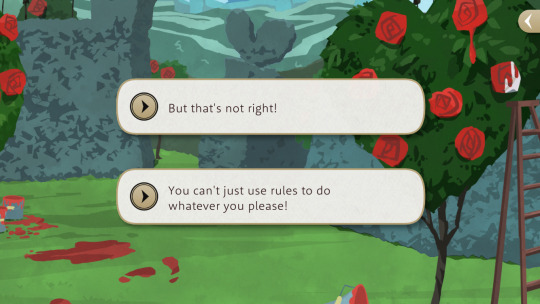
If you choose "But that's not right!", Riddle replies with, "I am the one who decides what is wrong and right! What sort of pitiful education have you received, that you cannot follow such simple rules?"


If you choose "You can't just use rules to do whatever you please!", then Riddle replies with, "If there were no penalties, no one would follow the rules. I have to wonder what sort of pitiful education left you unable to comprehend so simple a concept."
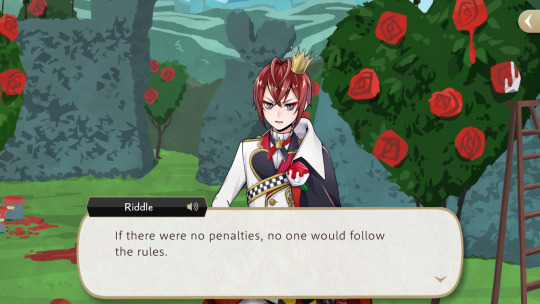
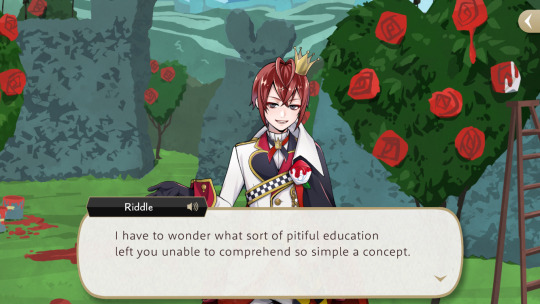
However, no matter which dialogue option you choose, Riddle continues on to say, "Clearly, you were born to parents with no great magical capability. And as a result... You lack even the basic education necessary to attend a school such as this. It's quite sad."
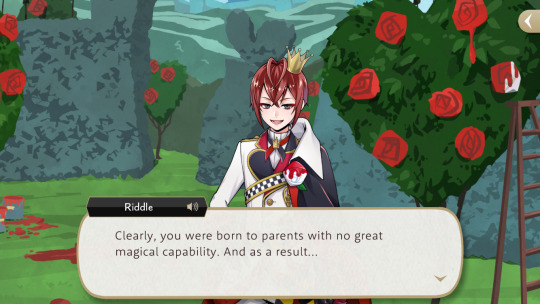

Deuce becomes upset after hearing this--but before he is able to act, Ace is already on his feet and manages to deck his dorm leader in the face.
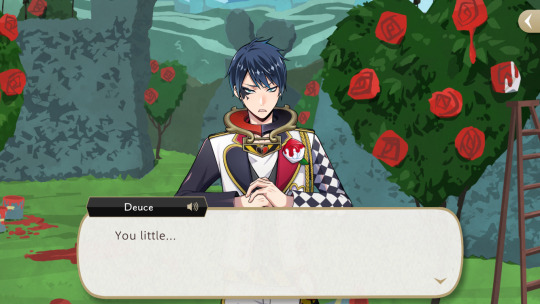
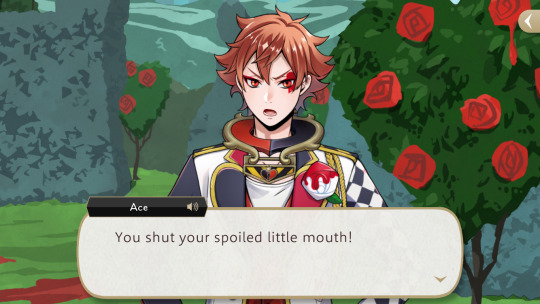
Based on the fact that Riddle seems to react to something that Yuu says, the framing here implies that the "you" Riddle is using refers to them specifically. As you can see above, both Ace and Deuce take offense to what Riddle says, but it is Ace that acts preemptively and attacks Riddle for his rudeness. This is what Ace x Yuu shippers will point to as a defining moment in their relationship (though, to be clear, this scene can definitely also be interpreted as platonic!!).
… Buuut it’s not completely clear that Riddle is explicitly directing any and all insults towards Yuu and Yuu alone, even if Yuu was the one to prompt his tirade. Due to the visual novel style format of the game, we have limited assets to base our interpretations off of, so going by the game alone may not be entirely accurate to what is happening in this scene. For example, we don't know how the characters are oriented relative to one another. It's possible that Riddle responds to Yuu's dialogue and then turns away to berate Yuu, Ace, and Deuce for their stupidity, since all three of them are, in his eyes, rule-breakers. We simply cannot tell due to the constraints of a visual novel. Let’s consult the manga adaptation and see how that presents 1-22.
In the Episode of Heartslabyul, the framing of the panels centers Riddle and Adeuce; Yuuken is not involved whatsoever. (On a prior page, all Yuuken remarks on is how fast Riddle is able to cast his spell; Yuuken has no lines similar to game!Yuu’s earlierdialogue options.) Riddle stands imposing over his opponents and rants at Ace and Deuce about their lack of an education. You can see that it really strikes a nerve with Deuce (whom we learned used to be a delinquent prior to NRC). This still results in Yuu punching Riddle.

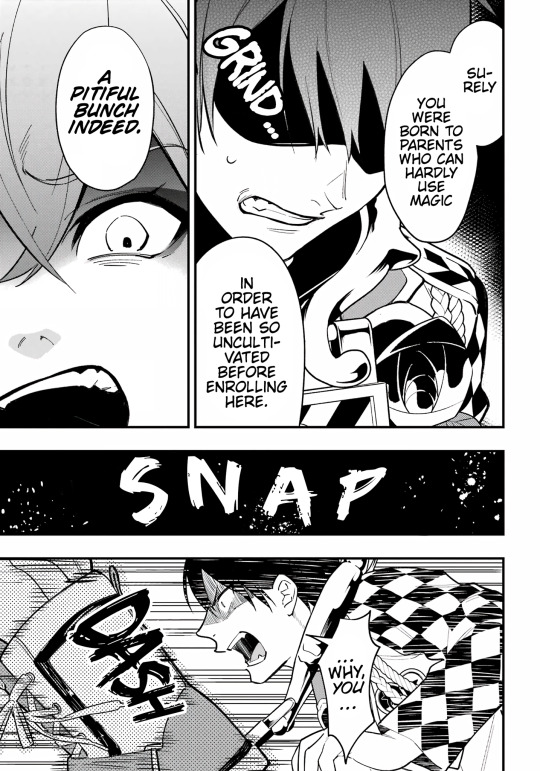
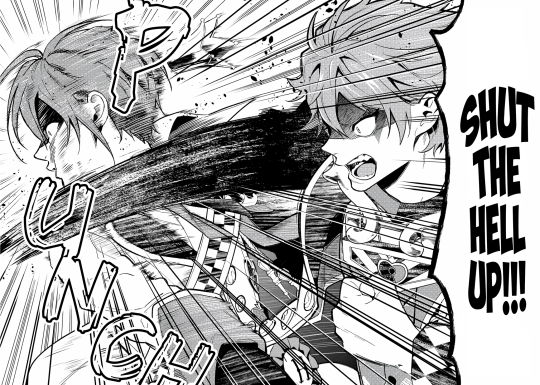
The manga seems to imply that Riddle is not insulting Yuu, but rather Adeuce. This makes sense to me, given that though all of them are rebels to Heartslabyul’s strict rules, Adeuce are the two who most directly challenge his authority.
You can see in a close-up panel that Deuce is gritting his teeth and trying to hold himself back from going at Riddle. The text in that panel involves the mention of parents who cannot use magic—which just so happens to be true of Deuce’s mother. The same mother that he worked so hard to make proud of, the mother he turned over a new leaf for. But again, it’s Ace that gets the hit in. Why is that?
Let’s check out our final source, the first volume of the light novel. On pages 319 and 320:

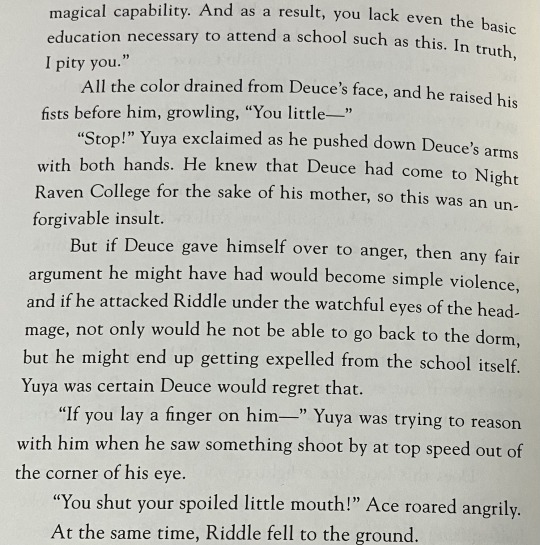
Riddle very clearly states “And as for you two.” This clearly refers to the fallen Ace and Deuce. He then unleashes his barrage of insults at them. Again, not at Yuu, but at Ace and Deuce. The text even goes on to remind us that Deuce would be especially rattled by Riddle’s words because of how he had come to NRC for the sake of his mom. In this version, we see our Yuu (Yuuya) being more involved by trying to keep Deuce from lashing out. Like in the game, however, Ace still gets in that punch on his dorm leader.
Okay, so… The game, manga, and light novels are different iterations of the same base story. Based on which you consume, you could walk away with an entirely different understanding of the scene in question. The game, being the most interactive medium with a self-insert main character, a gacha game which makes $$$ from endearing the characters to us, has the set-up which is most conducive for yumeshipping and thus making the player feel beloved and important in 1-22. This is obvious if you also consider that many fanservicey lines from other parts of the game (such as Ace wanting to sleep in Yuu’s room) being left out of the manga. It's also entirely possible that Riddle first reacts to what Yuu says, and THEN shifts his attention to address the group rather than just Yuu. The manga, with a more standoffish and level-headed Yuu, doesn’t speak up like game!Yuu does, so Riddle instead directly insults Ace and Deuce. The light novel, which features a timid and non-confrontational Yuu, is focused on deescalating the situation. And, like the manga, the light novel is NOT interactive and so it doesn’t need to concern itself with making the player feel special. Riddle isn’t mandated to acknowledge Yuu; he can instead be mad at Ace and Deuce all he likes.
If we were to combine information from across the game, manga, and light novel to decipher what is “truly” happening, here’s how I see it!
The light novel contains a scene exclusive to it on pages 176 and 177. As Ace is making himself comfortable at Ramshackle, he formally apologizes to Yuuya for being mean to him in the prologue. Ace explains that his meanness was because he thought that Yuuya had bullied his way to be admitted to NRC under special circumstances. “[…] the rest of us had to work our butts off to get in, and you just sorta walked in.” He proclaims that this was unfair, so it annoyed him.
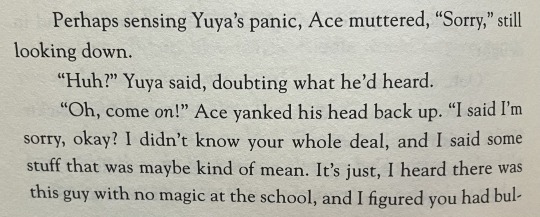
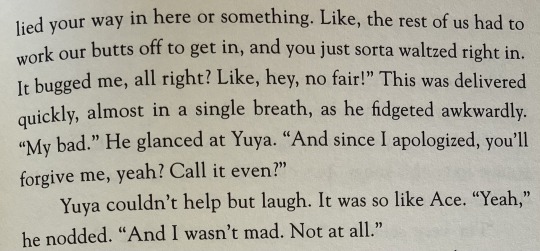
This makes a lot of sense for Ace’s character. In book 7 of the main story, he expresses that he is insecure about being an ordinary mage and that he hadn’t even developed his UM yet. (Coincidentally, he has a Chat where he praises the Queen of Hearts for having no special magic but still being able to make it big—perhaps because her circumstances remind Ace of himself?) He calls himself lame and pathetic, someone who is always looking for an excuse to take the easy way out. This is in spite of the bravado he puts on and how he often brags about being better or smarter than Deuce (most notably in book 5). If we believe the light novel dialogue, Ace worked hard to get invited to NRC. He has pride in earning this, and he has something to prove while he is there. Recall that his older brother is an alumnus of the school, and that his own father is a magicless human. Ace canonically has a good relationship with both of these family members and often bonds with them through little things like card trick competitions. When Riddle insults Ace's background... he is also insulting Ace's brother and father. He is also insulting all the effort Ace put forth to get into NRC in the first place. Ace would of course lose it--especially when he has been the primary victim of Riddle's rage for most of book 1. He's the first to be collared, the one who had to apologize and attempted to make an apology tart (which got rejected). Bro's fed UP having to bend the knee to a tyrant and sick of watching everyone else do the same. The punch that comes out of it seems to me like the result of all Ace's pent-up frustrations, as well as his own fury at Riddle speaking ill of him and his family.
While Ace is unquestionably willing to ride or die for Yuu in books 4 (he takes a long public transit route from the Queendom to Sage's Island after receiving a SOS text from them) and 6 (he tries to protect his friends from Ferrymen)... I think book 1's a bit too early for him to be SO loyal to Yuu that he'd get this angry on their behalf and sock Riddle. (Book 1 takes place during the first week of school; Ace seems to have only known Yuu for a few days at this point + hasn't really hung out with them besides sleeping over at Ramshackle since he's not allowed back at Heartslabyul.) His punch definitely feels fueled by a bunch of other things rather than being extremely motivated to defend Yuu's honor. I think maybe a case could be made for the game specifically, since that's the only version where Yuu is potentially addressed rather than Ace and Deuce being addressed. However, this does take some extrapolation. You'd have to assume that Ace is actually very attached to Yuu this early on or pair it with the idea that Ace is sensitive about magicless humans in general being discriminated against because of his own father being magicless (ie Ace was insulted by proxy, even if Riddle might have aimed the comments at Yuu). Not sure if the latter argument holds up very well though, considering that Ace himself did discriminate against Yuu in the prologue because they lacked magic. Likewise, he doesn't get mad for Fellow and Gidel in Playful Land when they share about being looked down on for not being magically inclined. But hey, maybe that was just Ace being in denial and acting contrary in order to cope with his own complicated feelings on the topic. He’s been known to behave like this anyway, acting cocky despite having no UM and denying that Yuu would go home (even though we later find out he deeply does not wish for this to happen).
I definitely think that many of the game-exclusive lines and content are there as fanservice for the players, who are encouraged to project or to self-insert as Yuu. Ace in particular is one of the characters who gets a ton of this kind of yumejoshi bait-y stuff. Everyone has it to some extent, but Ace is one of the rare few who has several pretty overt instances in the main story (whereas most other characters have their fanservice content relegated to voice lines and maybe some events). On top of this scene (which could potentially read as "Ace defending Yuu's honor"), we have: multiple instances of Ace offering to share a room/bed with Yuu (once in book 1, again in book 3), he has shared his number with Yuu and invites them to call him if they "miss him", Ace's entire book 7 dream revolving around a reality in which Yuu is able to freely traverse between Twisted Wonderland and their original world (furthermore, he is the ONLY dreamer we have seen in which Yuu is involved in the dream), etc. Ace is also known to frequently tease Yuu, and, on top of having several voice lines inviting them to hang out, is actually shown hanging out with them and caring about them in various vignettes and events. For example, he has movie nights with Yuu (Idia's Labwear vignettes), asks for their opinion on whether or not he looks the part to woo the Ghost Bride, rides roller coasters with them in Playful Land while previously complaining that his ex-girlfriend wouldn’t, and worries for where Yuu might be (Endless Halloween Night). With this abundance of Ace and Yuu content, I can see why people that have the shipping goggles on--and even those who don't--might interpret early scenes as Ace acting out for Yuu's sake, be it romantically or platonically. More objectively speaking and when considering the manga + light novel though, I don't think I personally read 1-22 that way. I enjoy Ace as a character and I support Ace x Yuu shippers, but the evidence and context suggests that he's venting other frustrations to me.
Again though, this is just my interpretation. Feel free to use this information however you’d like and come to your own conclusion.
#twst x reader#twisted wonderland x reader#Ace Trappola x Reader#twisted wonderland#twst#disney twisted wonderland#disney twst#notes from the writing raven#question#book 1 spoilers#twst light novel#twisted wonderland light novel#episode of heartslabyul#episode of heartslabyul spoilers#Yuu#Kuroki Yuuya#Yuuya Kuroki#Riddle Rosehearts#Deuce Spade#Ace Trappola#book 7 spoilers#book 7 chapter 12 part 3 spoilers#feedback for the writing raven#book 4 spoilers#book 6 spoilers#Gidel#Fellow Honest#Ernesto Foulworth#stage in playful land spoilers#endless halloween night spoilers
253 notes
·
View notes
Text
The way people reacted to Saltburn reminded me of a tiktok trend or "challenge" in which you had to watch the opening scene of Nocturnal Animals (2016).
(I'm not going to spoil the movie, go watch it is beautiful.)
It reminded me because the movie is so interesting and enthralling but it was played for jokes. No one was watching the movie, they felt "disgusted and uncomfortable" even though they didn't even tried to watch it.
The commentary of Saltburn was so similar, it really upset me. It was like people were saying "yeah, we watched it this time, it's still too gross".
Nocturnal Animals explores the tense relationship between the protagonists in a very gruesome and violent way. Those choices are not made for shock value, they tell a story. The same way Saltburn showed desire and obsession and in my opinion the perfect representation of unchecked limerence with the bathtub and cemetery scenes.
I have no doubt that in a few years they will be a new tiktok (or new platform) challenge that dares you to record your reaction of the cemetary scene with no context. And it makes me so sad.
It makes me sad not only because of the unappreciation of such amazing movies, but because I feel we are teaching teenagers to not have media literacy. I honestly feel like we're allowing people to just watch movies like they're cocomelon. And I think is dangerous for cinema.
Martin Scorcese shared in a few interviews how he feel that the popular movies are not really cinema, that they fail to convey real emotion and they don't take risks. I think he's right, he makes a direct reference to the MCU but to me he's describing at least 70% of the movies that comes out in a year.
Everything is simple, easy to understand, overly explained. A cast full of well known actors and a beautiful score, or a passable one, and you have a movie. You don't need a new story to tell, not really, you can just reuse an old one. Make a retelling, a remake, a live-action adaptation, a secuel or a prequel with lots of CGI. You got a movie, congrats.
To me the new movies are always disappointing, they're a way to kill time but never a moment to appreciate art.
And this is why the criticism of Saltburn frustrates and saddens me so much. Cause is not a perfect movie (well, to me it is), but is so SO much more than what we're served on a daily basis. It's rich and complex and beautiful to watch. The score is fun and playful and at times heartbreaking and breathtaking. The actors are just incredibly talented and well directed. The clothing and makeup is just a wonder to watch, going from the cringe of 2006 teenage fashion to the opulent gowns and suits. So much of this movie is a pleasure to observe, to discover.
It breaks my heart to think that the future of cinema is... white noise, filler, the equivalent to eating a sandwich instead of cooking a meal cause you're too tired to do more. So much so that when you're presented with a home cooked meal you're unable to enjoy the taste, too accustomed to simplicity.
149 notes
·
View notes
Text

I love Stan, but it's the other way around. Stan is the beloved one. Ford is the one everyone lambastes for *checks notes* being an autistic-coded abuse victim that has flaws.

You...you realize he was still mad at Stan because of the betrayal aspect, right? Not because of WCT? (Also I'm pretty sure he knew it existed). Stan was like. The one person Ford thought he could count on. Then Stan betrayed him. It turned out that he DIDN'T love him unconditionally like he thought. (No, Stan didn't ACTUALLY betray Ford, and Ford is WRONG about the idea that Stan doesn't love him but Ford has no way of knowing that).
Ford haters learn media literacy challenge.

Bill WAS abusing Ford. And if you don't think that matters, please never talk to an abuse victim.
Also lol. "I'm not victim blaming!" *proceeds to victim blame*
You literally are basically saying "why did you date him? You were warned he was bad news!"
Shut the fuck up lol.

More victim blaming. Also he thought he was summoning demon google.


And Ford has no way of knowing what Stan's been doing in that timeframe? He's not omniscient.
The apprenticeship was literally about him spending more time with Dipper, but go off I guess. He thought Mabel would be fine. He wasn't being "dismissive of her feelings", he thought highly of her, and thought she would be fine. We have now reached the ableism that Ford haters tend to spew--that is, demonizing him for his neurodivergent traits. Ford isn't emotionally intelligent and has low empathy, so clearly that means he prioritizes work over family and doesn't care about Stan or the twins (objectively untrue).
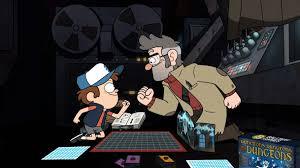
Yes, clearly the guy who stopped working immediately to play a game with his great nephew prioritizes work over family.
Then that last bit--more gross victim blaming.
"It's his own fault he got abused and tortured!"
Ford haters ARE the most insufferable people in the fandom. They hate autistic-coded abuse victims, and it's clear. Their lack of compassion for abuse victims and the victim blaming is disgusting.
#gravity falls#fandumb#ford pines#stanford pines#grunkle ford#abuse tw#victim blaming tw#filthy ford apologist squad#ford defense squad#ford protection squad
57 notes
·
View notes
Text
everyone talking about media literacy this media literacy that… the issue is that these motherfuckers are incapable of any nuanced thought that challenges their pre established opinion. they are watching a SCI FI TRAGEDY and approaching the “morality” of it from the realm of the possible in the real world. and let’s be fr, the show is continuing to disprove your preconceived notions of how it “is” or should be and you can’t handle that ! id say let’s go textual evidence for textual evidence baby!!! but ik yall can’t !!! SAD!
26 notes
·
View notes
Note
Welcome! Been waiting for your account! Meant to ask, Have you listened to the Ithaca saga yet? If so, are you still alive mentally?
I'm gonna be honest, I've asked if you guys want a Tumblr account from me BECAUSE I wanted to yap about the Ithaca Saga lol
@pomiidorii and I stayed up to watch the live, and it was SO much fun. I laughed so hard at the joystick infant, on Polyphemus with Luke being the Cyclops, Luck runs out with the macarena and the face slap, No longer you when Mason just decided to randomly dance with Jorge, or when Talya and Jay swapped roles during their songs. When they brought the ghost of Polites it was a great idea too, and LOL when Jay pointed at Luke during God Games for Zeus cheating on his wife, and his face completely dropped LMAO
But about the Ithaca Saga, I managed to not cry during it but it was really hard, considering the topics of families reuniting (or positive family dynamics) is one of the very few things that make me emotional. (Don't be fooled, I've cried after the live when I listened to the two last songs again...)
What I didn't expect was the vocals of Ayron in Hold them down, that was AMAZING. I fully thought I'd be skipping that song because I personally cannot handle the topic of SA very well in media, but the song itself was so good that I completely detached the meaning and now cannot stop singing it. During the animatic however, it was really hard to watch the part where Antinous sang about Penelope, it was truly sickening.
Odysseus was SO GOOD my jaw completely DROPPED. I LOVE when characters go completely apeshit after being wronged and (rightfully) take revenge (coming from an Ares devotee, this isn't that surprising). The appearance of Telemachus as the new Warrior of the mind?! And the way Ody just straight up refused to listen to any of the suitors, with his little sassy "No 🫶", I was SOLD.
Do NOT let me start about Anna completely SERVING vocals in The Challenge and Would you fall in love with me again, OH. MY. GOD. Her voice is such a beautiful mix of powerful and delicate, I don't get how she's doing it! And the part when Pen and Ody embrace and Just a man starts playing?? ARGHH!! Such an amazing use of literacy, Jorge has outdone himself.
Another little thing, the switch from Ody growling at the suitors and the second his boy asks for him, his voice softens to answer. STOP THIS MADNESS JORGE!! And when Mico and Jay hugged?? Oh my heart...
The interlude of Steven saying he couldn't come to Ithaca because of the beating he got LMAO and the singing in the shower LOL Neal Illustrator already made a great animatic with that part!
I cannot believe that EPIC is done now, it feels so weird. I remember randomly finding Jorge with the blue eye filter on TikTok and thinking, who is this weirdo? And immediately skipping him LMAO I had no idea that weirdo would come back months later with a full musical that I'd love so much! All in all, it was a great experience, even though I joined only around a month before the Vengeance Saga.
#epic#epic the musical#ithica saga#odysseus#epic penelope#penelope of ithaca#odysseus of ithaca#zeus#poseidon#hold them down#the challenge#would you fall in love with me again#i cant help but wonder#telemachus#jorge rivera herrans
31 notes
·
View notes
Text
it's easy to dunk on people with poor reading comprehension or to look down on them (consciously or not) even if you're not actively shaming them for "not getting it" or "being stupid" but it's not actually helpful. it's a worrying development that many people (particularly many young people) are becoming resistant to the idea that complex and/or challenging books have value but it's also an understandable development, because in many cases it's a reaction to being shamed for their struggles with literacy and not given the help they would've needed to develop an adequate level of literacy.
that's not even going into what should even be considered an "adequate" level of literacy to begin with, because the truth is that a lot of people will simply never be able to read better than absolutely necessary to navigate their daily life, and this shouldn't be treated as some kind of failure on their part. the goal of literacy education should be to give people the tools for self-sufficiency.
what's worrying is not that there are a lot of people who don't engage with complex texts, but that there are a lot of people who refuse to believe that there is something to be gained from engaging with complex texts. someone doesn't have to read or understand shakespeare or kafka or what-have-you in order to live a fulfilling life, but when they become resistant to the idea that a text can have something going on beyond what's immediately apparent on the surface, they become easy targets for deception. this hinders the self-sufficiency that literacy is supposed to provide them with.
the goal of you high school language class is not just to get you to analyze texts, but to introduce you to the idea that texts can be analyzed in the first place, even if you don't go on to be particularly good at actually analyzing them yourself. you don't need to be able to read between the lines to understand that it is possible to read between the lines, and that therefore a text that seems nonsensical to you at first may simply be written for an audience of a different skill level - this is only a problem if there is a mismatch between the complexity of the text and the literacy of its target audience. an inability to read for subtext is not a personal failure, nor does the ability to read for subtext make you a better person than someone who can't. literacy is a skill, and like any skill there are people to whom it comes more easily than others.
calling people who are drawn to anti-intellectual rhetoric due to their struggles with literacy stupid is not going to encourage them to change their mind. developing media literacy and reading comprehension is something that is very difficult to do on your own, and doubly so if any attempt at trying to learn is met with derision for not already being able to do it. the problem is not people who only engage with easy texts, the problem is people growing hostile towards the idea that there is worth in engaging with more complex texts
if reading comprehension has always come naturally to you, it can be difficult to grasp how someone can fail to understand a text that you thought was easy enough to follow. I myself am guilty of snapping at people for misinterpreting me so wildly it seemed like they were doing it on purpose. you need to learn to suppress this kneejerk reaction, and instead see this frustration as common ground: you are both facing a situation where your communication skills are insufficient. what can you do to bridge this gap? how can you present this information in different ways that better suit how the other party processes information? keep in mind that this does not necessarily mean to simplify the information, because nobody likes being condescended to, and being condescended to is in many cases exactly what made these people hostile towards more complex ideas to begin with.
I don't have an easy solution, because this is a complex problem, and what helps some people will inevitably be useless to many others. but I believe fostering a culture where you won't be met with derision or ridicule for not understanding something or needing more explanation will go a long way. next time someone comments on your post with an absolutely baffling take that makes you wonder if they even read what you said, consider that maybe they are trying to engage with a text that is above their reading level, and they genuinely lack the ability to parse and retain the information you presented in the way you presented it. if you're going to respond, try to do so in good faith.
495 notes
·
View notes
Text
“Rhaenyra finally realizing she was groomed”, “I was praying for days like these”…bla bla
1. Rhaenyra never said she was groomed or recognized she was groomed. She wasn’t groomed because they are in the game of thrones universe where Laena was sent to be married with Viserys when she was 12, and where Daemon and most characters were FORCED to be married while they still were KIDS. Everybody “dates” young here! Therefore it doesn’t exist the concept of grooming!!
2. Rhaenyra realized she couldn’t fix someone like Daemon, as much as she had wished it when she was a child. She now notices how broken he actually is and how there is no cure, because she doesn’t need to deal with Daemon’s problems as she, herself, now has challenges of her own in which Daemon should be supporting her.
That’s one thing COMPLETELY different to what antis are understanding (they are so biased, damn)
3. Let’s not forget that their relationship isn’t going to end. Rhaenyra LOVES Daemon as much as he loves her and his family. Daemon WAS MADE FOR RHAENYRA. He was created with the mere purpose of being her consort in the dance of the dragons. Not the other way around.
So stop being delulu and learn some media literacy before posting nonsense
#daemyra#daemon targaryen#house of the dragon#rhaenyra targaryen#daemon x rhaenyra#hotd#rhaenyra x daemon#matt smith#game of thrones#house targaryen#anti daemyra#anti daemon targaryen
72 notes
·
View notes